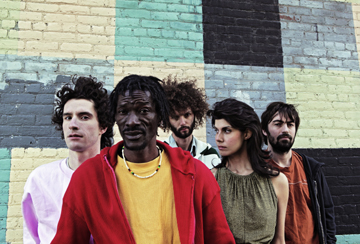Global Beat: Janka Nabay’s New Reign

On a torrentially rainy summer night in Williamsburg, Janka Nabay and his Bubu Gang work on populating their kingdom. The self-proclaimed Bubu King froths a few dozen to their feet at the small cafe. There’s isn’t a stage, and during instrumental breaks, Nabay dances with patrons. Beloved by both rebels and civilians during Sierra Leone’s decade-long civil war, Nabay and his old band were once kidnapped by an infamous warlord for two weeks who made them perform. Nabay is not quite as in demand in his new country, but that could potentially change with En Yay Sah, his full-length debut for Luaka Bop.
There isn’t much competition for the title of Bubu King. Like Ola Sesay – a U.S.-based long jumper who makes up half of Sierra Leone’s two-man Olympic team and for whom Nabay recently recorded a new song – Nabay’s displaced royalty is a small piece of the shattered country’s complicated legacy. Though En Yay Sah is his first American album, his cassettes once sold in the tens of thousands on the streets of Freetown, his music translating an ancient beat played on bamboo horns and car exhaust pipes during 36-hour Ramadan processionals.
“My ideas, I get them all from Sierra Leone,” Nabay says quietly. “They might seem new, but to me they’re old. When I visit the land again, I will get different ideas. I haven’t been to my hometown in seven years. I’m a little homesick.”
Quick to laugh, Nabay’s chiseled face and piercingly set eyes suggest long distances traveled, and his hushed, tense-shifting English is a reminder that he is still learning. In many ways, Nabay’s songs are about the immigrant experience. En Yay Sah translates to “I’m scared,” he notes.
“When the chance came, I was really ready to leave, and when I came here, I didn’t know nobody.” he recounts. “I don’t know where the music played. People put fear on you. Don’t talk to strangers, don’t talk to people or they’ll shoot you. You don’t go out for a very long time.”
Like many from his worn-torn country, Nabay had to start completely anew. “I know renowned doctors in Sierra Leone – surgeons and psychologists – and I see them here [in the U.S.] and they’re security guards.”
On the verge of returning disillusioned to Sierra Leone in 2008, he received a call from an assistant NPR producer who’d heard his music in a radio documentary and tracked him down via MySpace. Nabay paired up with Skeletons, an avant-pop act from Brooklyn. What followed hasn’t been precisely a whirlwind, but it has brought Nabay on a rare journey from the fringes of the African diaspora to something like the heart of American culture. At the very least, he’s played Bonnaroo, the gleaming white Getty Institute in Los Angeles, and dozens of clubs in Brooklyn and beyond.
Many of the songs on En Yay Sah – all except one sung in Krio, Temne or Arabic – constitute what Nabay calls “advice.” “It’s like writing a letter to your country,” he says, “talking about my experience on the way, and the differences between my own people and the people on the other side.”
But to confine or reduce Nabay’s music – or his life – to Sierra Leone since emigrating is a mistake. Extant field recordings of actual bubu ceremonies sound little like Nabay’s songs, and that’s entirely because of Janka’s instinctual redesign.
First, the exhaust pipes transformed into the sharply burbling keyboards and drum machines that blew up in Freetown. And now, under Nabay’s careful watch, the cassette-era synth beats have been turned into actual (and live electronic) drums by Skeletons drummer Jonathan Leland, adapting parts originally intended for a half-dozen musicians and gaining something magical in the process.
Any authenticity that Nabay trades in is his own, not merely because he is an African export. While his version of bubu is hardly possible without hundreds of years of tradition, it is more accurately brought to modern ears through its expression as the core tenet of Nabay’s existence.
“I invest my whole mind in this – my life,” he says, and it’s not hard to see how this is true. Unlike some of his countrymen, he has been able to continue the work he did before he left, as a musician. “I want to help people explore the bubu and bring some things that were never brought before,” he adds modestly.
“People ask me, ‘How did you learn music?’ and the answer is simple: I’m the Bubu King. I know the bubu music. I’m the one who popularized bubu music. And I’m not satisfied. The bubu music is not all over. I’ve got a long way to go.”
“Thank you so much for talking to the Bubu King,” he says later, not immodestly, but not without genuine affection – a King far from home.



















